主动表被动的13种情况
谈英语中主动形式表示被动含义的十一种情况
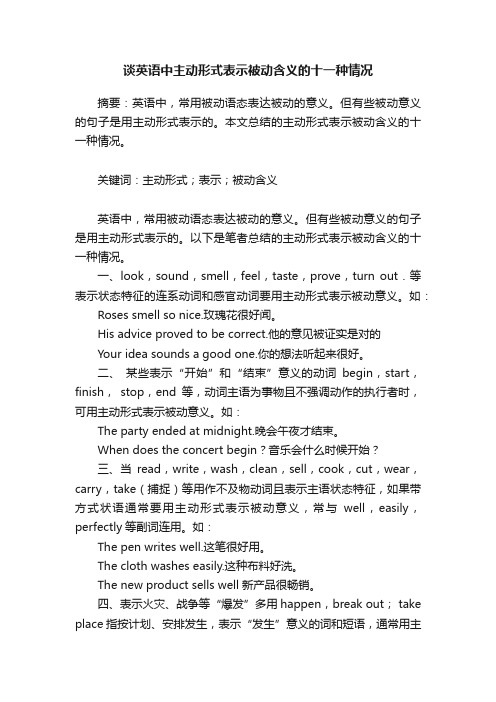
谈英语中主动形式表示被动含义的十一种情况摘要:英语中,常用被动语态表达被动的意义。
但有些被动意义的句子是用主动形式表示的。
本文总结的主动形式表示被动含义的十一种情况。
关键词:主动形式;表示;被动含义英语中,常用被动语态表达被动的意义。
但有些被动意义的句子是用主动形式表示的。
以下是笔者总结的主动形式表示被动含义的十一种情况。
一、look,sound,smell,feel,taste,prove,turn out.等表示状态特征的连系动词和感官动词要用主动形式表示被动意义。
如:Roses smell so nice.玫瑰花很好闻。
His advice proved to be correct.他的意见被证实是对的Your idea sounds a good one.你的想法听起来很好。
二、某些表示“开始”和“结束”意义的动词begin,start,finish,stop,end等,动词主语为事物且不强调动作的执行者时,可用主动形式表示被动意义。
如:The party ended at midnight.晚会午夜才结束。
When does the concert begin?音乐会什么时候开始?三、当read,write,wash,clean,sell,cook,cut,wear,carry,take(捕捉)等用作不及物动词且表示主语状态特征,如果带方式状语通常要用主动形式表示被动意义,常与well,easily,perfectly等副词连用。
如:The pen writes well.这笔很好用。
The cloth washes easily.这种布料好洗。
The new product sells well新产品很畅销。
四、表示火灾、战争等“爆发”多用happen,break out; take place指按计划、安排发生,表示“发生”意义的词和短语,通常用主动形式表示被动含义。
如:The story happened in 2008. 故事发生在2008年。
主动表被动12种情况

主动表被动12种情况⼀.谓语动词⽤主动表被动1. ⼀些连系动词(eg.look,sound,smell,feel,taste,prove) 要⽤主动形式表被动含义。
The table feels cold. My advice proved to be wrong.2.当open,close, shut ,lock, move 等⽤作不及物动词且与can't,won't等连⽤表⽰主语属性,常⽤主动表被动。
eg.The door won't open.3.当read,wash,clean, cook,cut,wear, carry, record等⽤作不及物动词且与副词well ,easily ,slowly,quickly 连⽤表⽰主语属性. The book sells well. The food doesn't cut easily.4.某些表⽰开始和结束的动词(eg.begin,start,finish,end)主语为事物且不强调动作执⾏者。
When does the concert begin?The play ended at ten o'clock.5.不及物动词及短语⽤主动表被动含义(eg.take place,happen,come about,break out,appear,disappear,last,arise,belong to) The war lasted 3 years.6.表⽰静态动词(have,lack,fit,hold,suit)The hall holds 100 people.The shoes don't fit me.⼆.⾮谓语动词主动表被动1.不定式to blame, to let⽤作表语,⽤主动表被动。
Who is to blame?The house is to let.2.主语+be +adj +to do(不定式作状语且与主语构成逻辑上动宾关系)The text is easy to understand.3.不定时作定语和所修饰的词构成动宾关系,且有句⼦主语来完成。
英语主动表被动用法归纳

英语主动表被动用法归纳
英语中的被动语态是表达动作的接收者的一种语法结构,而不是动作的执行者。
然而,有时我们也会使用主动语态来表示被动意义,这就是主动表被动用法。
以下是一些常见的主动表被动用法的归纳:
1. "动词+ oneself" 结构:这种结构表示主语自己对自己进行某个动作,有自我参考的意味。
例如:He hurt himself while playing soccer.
2. "动词+ each other" 结构:这种结构表示两个或多个主语互相进行某个动作。
例如:They helped each other with their homework.
3. "动词+ something" 结构:这种结构表示主语对某个物体进行某个动作。
例如:She painted the wall white.
4. "be + 动词过去分词" 结构:这种结构表示主语的状态或特征。
例如:The window was broken by the ball.
5. "get + 动词过去分词" 结构:这种结构表示主语经历了某种变化或受到某种影响。
例如:She got lost in the city.
6. "become + 动词过去分词" 结构:这种结构表示主语变成了某种状态或特征。
例如:The water became ice.
以上是一些常见的主动表被动用法。
1。
英语中主动表被动现象归纳总结
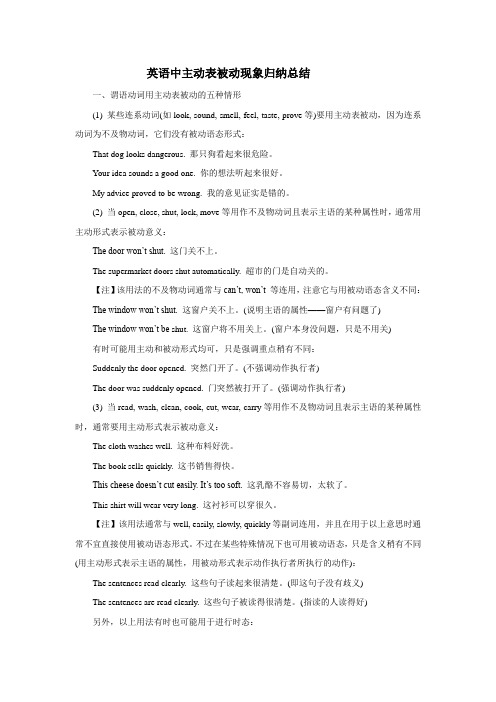
英语中主动表被动现象归纳总结一、谓语动词用主动表被动的五种情形(1) 某些连系动词(如look, sound, smell, feel, taste, prove等)要用主动表被动,因为连系动词为不及物动词,它们没有被动语态形式:That dog looks dangerous. 那只狗看起来很危险。
Your idea sounds a good one. 你的想法听起来很好。
My advice proved to be wrong. 我的意见证实是错的。
(2) 当open, close, shut, lock, move等用作不及物动词且表示主语的某种属性时,通常用主动形式表示被动意义:The door won’t shut. 这门关不上。
The supermarket doors shut automatically. 超市的门是自动关的。
【注】该用法的不及物动词通常与can’t, won’t 等连用,注意它与用被动语态含义不同:The window won’t shut. 这窗户关不上。
(说明主语的属性——窗户有问题了)The window won’t be shut. 这窗户将不用关上。
(窗户本身没问题,只是不用关)有时可能用主动和被动形式均可,只是强调重点稍有不同:Suddenly the door opened. 突然门开了。
(不强调动作执行者)The door was suddenly opened. 门突然被打开了。
(强调动作执行者)(3) 当read, wash, clean, cook, cut, wear, carry等用作不及物动词且表示主语的某种属性时,通常要用主动形式表示被动意义:The cloth washes well. 这种布料好洗。
The book sells quickly. 这书销售得快。
This cheese doesn’t cut easily. It’s too soft. 这乳酪不容易切,太软了。
动词不定式主动形式表被动
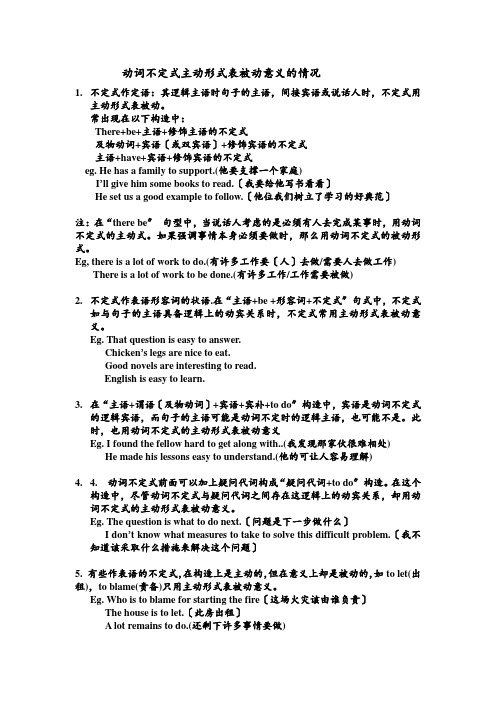
动词不定式主动形式表被动意义的情况1.不定式作定语:其逻辑主语时句子的主语,间接宾语或说话人时,不定式用主动形式表被动。
常出现在以下构造中:There+be+主语+修饰主语的不定式及物动词+宾语〔或双宾语〕+修饰宾语的不定式主语+have+宾语+修饰宾语的不定式eg. He has a family to support.(他要支撑一个家庭)I’ll give him some books to read.〔我要给他写书看看〕He set us a good example to follow.〔他位我们树立了学习的好典范〕注:在“there be〞句型中,当说话人考虑的是必须有人去完成某事时,用动词不定式的主动式。
如果强调事情本身必须要做时,那么用动词不定式的被动形式。
Eg, there is a lot of work to do.(有许多工作要〔人〕去做/需要人去做工作) There is a lot of work to be done.(有许多工作/工作需要被做)2.不定式作表语形容词的状语.在“主语+be +形容词+不定式〞句式中,不定式如与句子的主语具备逻辑上的动宾关系时,不定式常用主动形式表被动意义。
Eg. That question is easy to answer.Chicken’s legs are nice to eat.Good novels are interesting to read.English is easy to learn.3.在“主语+谓语〔及物动词〕+宾语+宾补+to do〞构造中,宾语是动词不定式的逻辑宾语,而句子的主语可能是动词不定时的逻辑主语,也可能不是。
此时,也用动词不定式的主动形式表被动意义Eg. I found the fellow hard to get along with..(我发现那家伙很难相处) He made his lessons easy to understand.(他的可让人容易理解)4. 4. 动词不定式前面可以加上疑问代词构成“疑问代词+to do〞构造。
高中英语主动形式表被动意义的十种情况
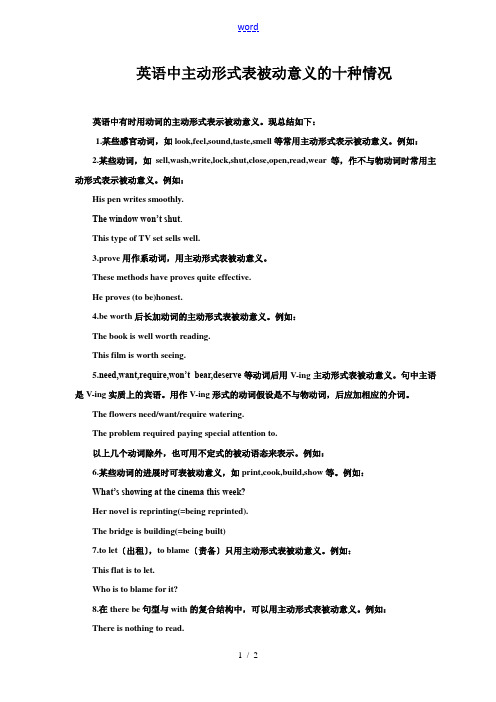
英语中主动形式表被动意义的十种情况英语中有时用动词的主动形式表示被动意义。
现总结如下:1.某些感官动词,如look,feel,sound,taste,smell等常用主动形式表示被动意义。
例如:2.某些动词,如sell,wash,write,lock,shut,close,open,read,wear等,作不与物动词时常用主动形式表示被动意义。
例如:His pen writes smoothly.The window won’t shut.This type of TV set sells well.3.prove用作系动词,用主动形式表被动意义。
These methods have proves quite effective.He proves (to be)honest.4.be worth后长加动词的主动形式表被动意义。
例如:The book is well worth reading.This film is worth seeing.5.need,want,require,won’t bear,deserve等动词后用V-ing主动形式表被动意义。
句中主语是V-ing实质上的宾语。
用作V-ing形式的动词假设是不与物动词,后应加相应的介词。
The flowers need/want/require watering.The problem required paying special attention to.以上几个动词除外,也可用不定式的被动语态来表示。
例如:6.某些动词的进展时可表被动意义,如print,cook,build,show等。
例如:What’s showing at the cinema this week?Her novel is reprinting(=being reprinted).The bridge is building(=being built)7.to let〔出租〕,to blame〔责备〕只用主动形式表被动意义。
(完整版)英语主动表被动用法归纳
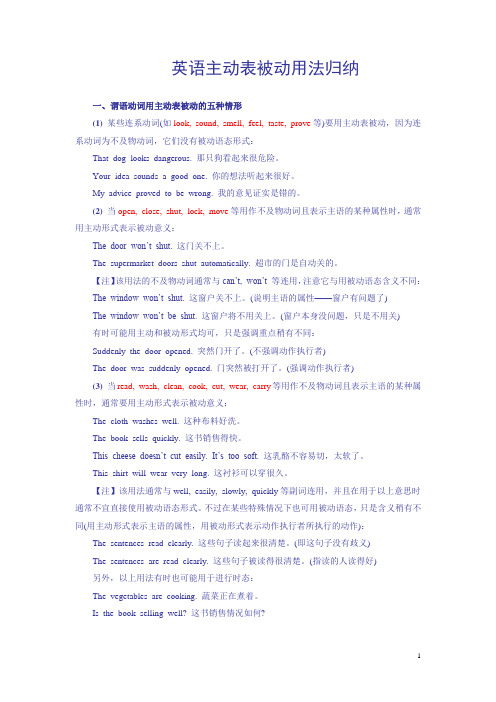
英语主动表被动用法归纳一、谓语动词用主动表被动的五种情形(1)某些连系动词(如look, sound, smell, feel, taste, prove等)要用主动表被动,因为连系动词为不及物动词,它们没有被动语态形式:That dog looks dangerous. 那只狗看起来很危险。
Your idea sounds a good one. 你的想法听起来很好。
My advice proved to be wrong. 我的意见证实是错的。
(2)当open, close, shut, lock, move等用作不及物动词且表示主语的某种属性时,通常用主动形式表示被动意义:The door won’t shut. 这门关不上。
The supermarket doors shut automatically. 超市的门是自动关的。
【注】该用法的不及物动词通常与can’t, won’t 等连用,注意它与用被动语态含义不同:The window won’t shut. 这窗户关不上。
(说明主语的属性——窗户有问题了)The window won’t be shut. 这窗户将不用关上。
(窗户本身没问题,只是不用关)有时可能用主动和被动形式均可,只是强调重点稍有不同:Suddenly the door opened. 突然门开了。
(不强调动作执行者)The door was suddenly opened. 门突然被打开了。
(强调动作执行者)(3)当read, wash, clean, cook, cut, wear, carry等用作不及物动词且表示主语的某种属性时,通常要用主动形式表示被动意义:The cloth washes well. 这种布料好洗。
The book sells quickly. 这书销售得快。
This cheese doesn’t cut easily. It’s too soft. 这乳酪不容易切,太软了。
(完整版)主动表被动的13种情况
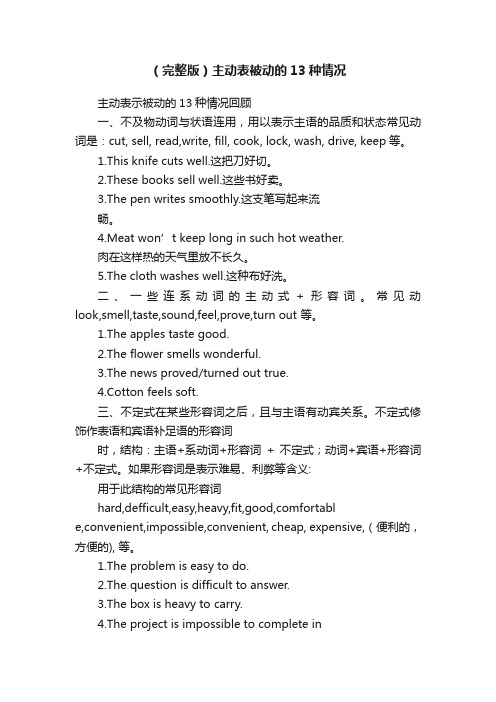
(完整版)主动表被动的13种情况主动表示被动的13种情况回顾一、不及物动词与状语连用,用以表示主语的品质和状态常见动词是:cut, sell, read,write, fill, cook, lock, wash, drive, keep等。
1.This knife cuts well.这把刀好切。
2.These books sell well.这些书好卖。
3.The pen writes smoothly.这支笔写起来流畅。
4.Meat won’t keep long in such hot weather.肉在这样热的天气里放不长久。
5.The cloth washes well.这种布好洗。
二、一些连系动词的主动式+形容词。
常见动look,smell,taste,sound,feel,prove,turn out 等。
1.The apples taste good.2.The flower smells wonderful.3.The news proved/turned out true.4.Cotton feels soft.三、不定式在某些形容词之后,且与主语有动宾关系。
不定式修饰作表语和宾语补足语的形容词时,结构:主语+系动词+形容词+ 不定式;动词+宾语+形容词+不定式。
如果形容词是表示难易、利弊等含义:用于此结构的常见形容词hard,defficult,easy,heavy,fit,good,comfortable,convenient,impossible,convenient, cheap, expensive,(便利的,方便的), 等。
1.The problem is easy to do.2.The question is difficult to answer.3.The box is heavy to carry.4.The project is impossible to complete ina year.5.The question is difficult to answer.这个问题很难回答。
英语中主动表被动的情况
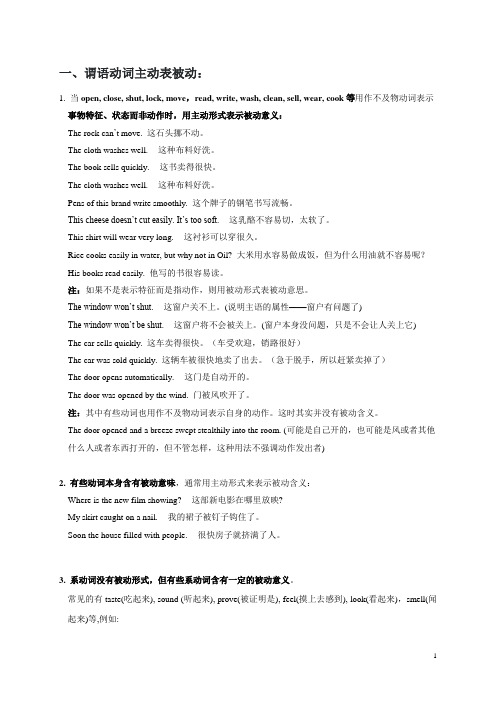
一、谓语动词主动表被动:1. 当open, close, shut, lock, move,read, write, wash, clean, sell, wear, cook等用作不及物动词表示事物特征、状态而非动作时,用主动形式表示被动意义:The rock can’t move. 这石头挪不动。
The cloth washes well.这种布料好洗。
The book sells quickly.这书卖得很快。
The cloth washes well.这种布料好洗。
Pens of this brand write smoothly. 这个牌子的钢笔书写流畅。
This cheese doesn’t cut easily. It’s too soft.这乳酪不容易切,太软了。
This shirt will wear very long.这衬衫可以穿很久。
Rice cooks easily in water, but why not in Oil? 大米用水容易做成饭,但为什么用油就不容易呢?His books read easily. 他写的书很容易读。
注:如果不是表示特征而是指动作,则用被动形式表被动意思。
The window won’t shut.这窗户关不上。
(说明主语的属性——窗户有问题了)The window won’t be shut.这窗户将不会被关上。
(窗户本身没问题,只是不会让人关上它) The car sells quickly. 这车卖得很快。
(车受欢迎,销路很好)The car was sold quickly. 这辆车被很快地卖了出去。
(急于脱手,所以赶紧卖掉了)The door opens automatically.这门是自动开的。
The door was opened by the wind. 门被风吹开了。
注:其中有些动词也用作不及物动词表示自身的动作。
这时其实并没有被动含义。
主动表被动的常见情形

主动表被动的常见情形(1) 连用动词用主动表被动:尤其是表示“……起来”的系动词,如sound(听起来), taste(吃起来), smell(闻起来), feel(摸起来), look, seem(看起来)等,尽管它在汉语意思含有被动意味,但英语却要用主动形式表示被动含义。
如:绸子摸起来柔软光滑。
误:Silk is felt soft and smooth.正:Silk feels soft and smooth.他并不像他看起来那么傻。
误:He is not such a fool as he is looked.正:He is not such a fool as he looks.(2) 某些不及动词用主动表被动:用作不及物动词的open, close, shut, read, write, translate, wash, clean, lock, sell, wear, cut, cook 等,当主语是物,且因该事物本身具有某一固有特点使得谓语动词能以某种方式得以实现或难以实现时,用主动形式表示被动含义。
如:The book sells well. 这本书卖得不错。
The window won’t open. 窗子打不开了。
This shirt will wear very long. 这衬衫可以穿很久。
This cheese doesn’t cut easily. It’s too soft. 这乳酪不容易切,太软了。
(3) 关于let, blame:不定式to blame, to let等作表语时,用主动表示被动。
如:This house is to let. 此房出租。
Nobody is to blame for it. 谁也不该埋怨。
(4) 几个表示“需要”的动词:在表示“(某物)需要”的need, want, require等后的动名词用主动形式表示被动含义。
如:The house wants painting(= to be painted). 房子需要油漆了。
(完整版)主动表被动的13种情况
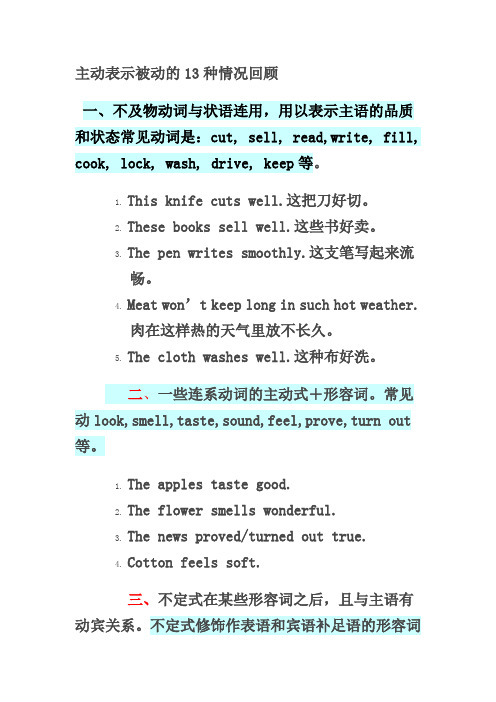
主动表示被动的13种情况回顾一、不及物动词与状语连用,用以表示主语的品质和状态常见动词是:cut, sell, read,write, fill, cook, lock, wash, drive, keep等。
1.This knife cuts well.这把刀好切。
2.These books sell well.这些书好卖。
3.The pen writes smoothly.这支笔写起来流畅。
4.Meat won’t keep long in such hot weather.肉在这样热的天气里放不长久。
5.The cloth washes well.这种布好洗。
二、一些连系动词的主动式+形容词。
常见动look,smell,taste,sound,feel,prove,turn out 等。
1.The apples taste good.2.The flower smells wonderful.3.The news proved/turned out true.4.Cotton feels soft.三、不定式在某些形容词之后,且与主语有动宾关系。
不定式修饰作表语和宾语补足语的形容词时,结构:主语+系动词+形容词 + 不定式;动词+宾语+形容词+不定式。
如果形容词是表示难易、利弊等含义:用于此结构的常见形容词hard,defficult,easy,heavy,fit,good,comfortabl e,convenient,impossible,convenient, cheap, expensive,(便利的,方便的), 等。
1.The problem is easy to do.2.The question is difficult to answer.3.The box is heavy to carry.4.The project is impossible to complete ina year.5.The question is difficult to answer.这个问题很难回答。
英语中的主动表被动语法总结
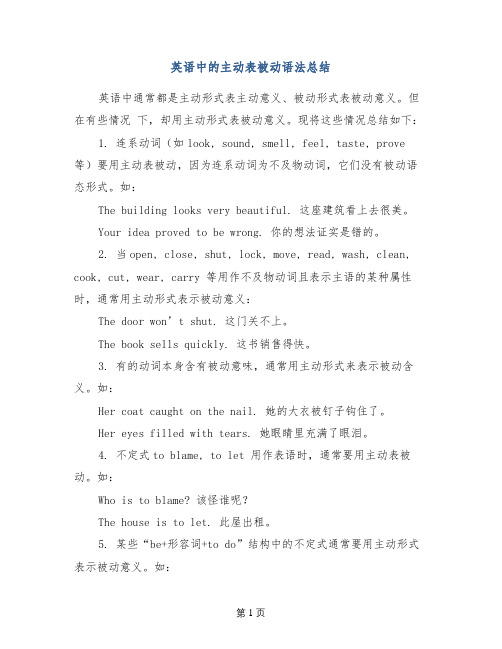
英语中的主动表被动语法总结英语中通常都是主动形式表主动意义、被动形式表被动意义。
但在有些情况下,却用主动形式表被动意义。
现将这些情况总结如下:1. 连系动词(如look, sound, smell, feel, taste, prove 等)要用主动表被动,因为连系动词为不及物动词,它们没有被动语态形式。
如:The building looks very beautiful. 这座建筑看上去很美。
Your idea proved to be wrong. 你的想法证实是错的。
2. 当open, close, shut, lock, move, read, wash, clean, cook, cut, wear, carry 等用作不及物动词且表示主语的某种属性时,通常用主动形式表示被动意义:The door won’t shut. 这门关不上。
The book sells quickly. 这书销售得快。
3. 有的动词本身含有被动意味,通常用主动形式来表示被动含义。
如:Her coat caught on the nail. 她的大衣被钉子钩住了。
Her eyes filled with tears. 她眼睛里充满了眼泪。
4. 不定式to blame, to let 用作表语时,通常要用主动表被动。
如:Who is to blame? 该怪谁呢?The house is to let. 此屋出租。
5. 某些“be+形容词+to do”结构中的不定式通常要用主动形式表示被动意义。
如:The book is difficult to understand. 这书很难懂。
The music isn’t pleasant to listen to. 这音乐不好听。
The picture is interesting to look at. 这幅画看起来挺有趣的。
注:这类结构的特点是句子主语就是其后不定式的逻辑宾语,按理说其中的不定式要用被动形式,但习惯上却要用主动表被动。
主动形式表示被动意义的十二种情况
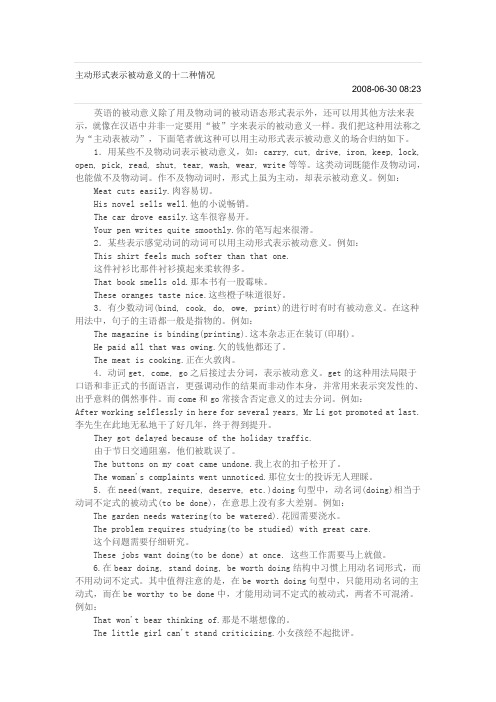
英语的被动意义除了用及物动词的被动语态形式表示外,还可以用其他方法来表示,就像在汉语中并非一定要用“被”字来表示的被动意义一样。
我们把这种用法称之为“主动表被动”,下面笔者就这种可以用主动形式表示被动意义的场合归纳如下。
1.用某些不及物动词表示被动意义,如:carry, cut, drive, iron, keep, lock, open, pick, read, shut, tear, wash, wear, write等等。
这类动词既能作及物动词,也能做不及物动词。
作不及物动词时,形式上虽为主动,却表示被动意义。
例如:Meat cuts easily.肉容易切。
His novel sells well.他的小说畅销。
The car drove easily.这车很容易开。
Your pen writes quite smoothly.你的笔写起来很滑。
2.某些表示感觉动词的动词可以用主动形式表示被动意义。
例如:This shirt feels much softer than that one.这件衬衫比那件衬衫摸起来柔软得多。
That book smells old.那本书有一股霉味。
These oranges taste nice.这些橙子味道很好。
3.有少数动词(bind, cook, do, owe, print)的进行时有时有被动意义。
在这种用法中,句子的主语都一般是指物的。
例如:The magazine is binding(printing).这本杂志正在装订(印刷)。
He paid all that was owing.欠的钱他都还了。
The meat is cooking.正在火敦肉。
4.动词get, come, go之后接过去分词,表示被动意义。
get的这种用法局限于口语和非正式的书面语言,更强调动作的结果而非动作本身,并常用来表示突发性的、出乎意料的偶然事件。
而come和go常接含否定意义的过去分词。
英语中主动表被动总结
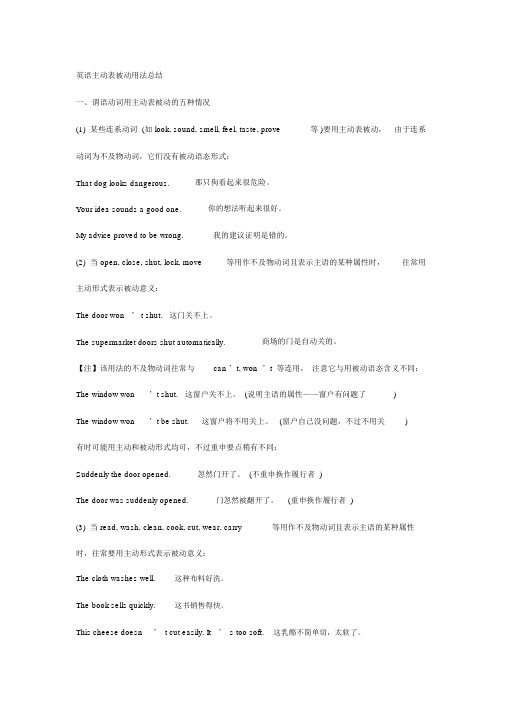
英语主动表被动用法总结一、谓语动词用主动表被动的五种情况(1) 某些连系动词 (如 look, sound, smell, feel, taste, prove等 )要用主动表被动,由于连系动词为不及物动词,它们没有被动语态形式:That dog looks dangerous.那只狗看起来很危险。
Your idea sounds a good one.你的想法听起来很好。
My advice proved to be wrong.我的建议证明是错的。
(2) 当 open, close, shut, lock, move等用作不及物动词且表示主语的某种属性时,往常用主动形式表示被动意义:The door won ’ t shut. 这门关不上。
The supermarket doors shut automatically.商场的门是自动关的。
【注】该用法的不及物动词往常与can ’t, won ’t 等连用,注意它与用被动语态含义不同:The window won’t shut. 这窗户关不上。
(说明主语的属性——窗户有问题了)The window won’t be shut.这窗户将不用关上。
(窗户自己没问题,不过不用关)有时可能用主动和被动形式均可,不过重申要点稍有不同:Suddenly the door opened.忽然门开了。
(不重申换作履行者 )The door was suddenly opened.门忽然被翻开了。
(重申换作履行者 )(3) 当 read, wash, clean, cook, cut, wear, carry等用作不及物动词且表示主语的某种属性时,往常要用主动形式表示被动意义:The cloth washes well.这种布料好洗。
The book sells quickly.这书销售得快。
This cheese doesn’ t cut easily. It’ s too soft.这乳酪不简单切,太软了。
主动表被动的种情况

主动表被动的种情况 Document serial number【UU89WT-UU98YT-UU8CB-UUUT-UUT108】主动表示被动的13种情况回顾主动表示被动的13种情况回顾各位同学国庆节快乐:被动语态是英语学习中的主要语法项目,是高考每年必考项目。
要想正确地使用被动语态,就须注意哪些动词是及物的,哪些是不及物的。
特别是一词多义的动词往往有两种用法。
在英语学习中,有许多地方按中文思维要用被动语态,但英语表达思维方式就必须用主动表被动,这对许多学生来说是一个难点,常常让他们感到不好学,不好掌握。
解决这一问题唯有在学习过程中多留意积累。
在此小结如下13种主动表示被动的情况:一、不及物动词与状语连用,用以表示主语的品质和状态常见动词是:cut, sell, read,write, fill, cook, lock, wash, drive, keep等。
1.This knife cuts well.这把刀好切。
2.These books sell well.这些书好卖。
3.The pen writes smoothly.这支笔写起来流畅。
4.Meat won’t keep long in such hot weather.肉在这样热的天气里放不长久。
5.The cloth washes well.这种布好洗。
二、一些连系动词的主动式+形容词。
常见动look,smell,taste,sound,feel,prove,turn out等。
1.The apples taste good.2.The flower smells wonderful.3.The news proved/turned out true.4.Cotton feels soft.三、不定式在某些形容词之后,且与主语有动宾关系。
不定式修饰作表语和宾语补足语的形容词时,结构:主语+系动词+形容词 + 不定式;动词+宾语+形容词+不定式。
超强好记主动表被动的几种情况

7. 在“主语+be+形容词〔for sb.〕+to do〞构 造中,to do用主动形式。 e.g. 这道数学题很难解。
The maths problem is difficult to work out. 那种人很难对付。
That kind of person is hard to deal with.
8. 在“主语+谓语+宾语〔名词〕+动词不定式 to do〞句型中,不定式作后置定语修饰前面的 名词,且为动宾关系,用主动形式表被动含义。 e.g. I have a meeting to attend. 恐怕我不能参加今晚的聚会了,因为我还有很 多作业要做。
I’m afraid I can’t take part in the party tonight, as I still have lots of homework to do.
3. 不及物动词及一些固定短语不能用被动语态: come up, run out〔用完〕, give out〔耗尽〕, go out〔熄灭〕, come out〔出版〕, come to light, belong to, break out, lose heart, die out, own, have, possess, happen, occur等。 e.g. The oil is running out.
The window won’t be shut. 这窗户将不用关上。(窗 户本身没问题,只是不用关)
有时可能用主动和被动形式均可,只是强调重点稍有 不同:
Suddenly the door opened. 突然门开了。(不强调动 作执行者)
The door was suddenly opened. 门突然被翻开了。 (强调动作执行者)
- 1、下载文档前请自行甄别文档内容的完整性,平台不提供额外的编辑、内容补充、找答案等附加服务。
- 2、"仅部分预览"的文档,不可在线预览部分如存在完整性等问题,可反馈申请退款(可完整预览的文档不适用该条件!)。
- 3、如文档侵犯您的权益,请联系客服反馈,我们会尽快为您处理(人工客服工作时间:9:00-18:30)。
主动表示被动的13种情况回顾
一、不及物动词与状语连用,用以表示主语的品质和状态常见动词是:cut, sell, read,write, fill, cook, lock, wash, drive, keep等。
1.This knife cuts well.这把刀好切。
2.These books sell well.这些书好卖。
3.The pen writes smoothly.这支笔写起来流
畅。
4.Meat won’t keep long in such hot weather.
肉在这样热的天气里放不长久。
5.The cloth washes well.这种布好洗。
二、一些连系动词的主动式+形容词。
常见动look,smell,taste,sound,feel,prove,turn out 等。
1.The apples taste good.
2.The flower smells wonderful.
3.The news proved/turned out true.
4.Cotton feels soft.
三、不定式在某些形容词之后,且与主语有动宾关系。
不定式修饰作表语和宾语补足语的形容词
时,结构:主语+系动词+形容词 + 不定式;动词+宾语+形容词+不定式。
如果形容词是表示难易、利弊等含义:
用于此结构的常见形容词
hard,defficult,easy,heavy,fit,good,comfortabl e,convenient,impossible,convenient, cheap, expensive,(便利的,方便的), 等。
1.The problem is easy to do.
2.The question is difficult to answer.
3.The box is heavy to carry.
4.The project is impossible to complete in
a year.
5.The question is difficult to answer.这
个问题很难回答。
6.The work is easy to do.这项工作很好做。
7.I found the car comfortable to ride in.
我觉得这种车很好坐。
8.They think it difficult to finish the work
in such bad weather.他们认为在这样恶劣
的天气里很难完成这项工作。
9.That makes poetry difficult to write.那
就使得诗很难写。
10.She was as easy to please as her
father. 她如她妈妈一样容易取悦。
四、Need, want, require(要求,需要), deserve(应得,值得), be worth值得),not bear(经不住) 后面接doing主动表被动。
1.The book is worth reading.这本书值得一
读。
2.The old building requires repairing.这
座古建筑需要修了。
3.These young seedlings will require/need
looking after (=need to be looked after)
carefully.这些幼苗将需要小心的照管。
4.Your hair wants/needs cutting (needs to
be cut).你的头发该剪了。
五、不定式作定语,放在被修饰词后面,与前面被修饰的名词或代词有动宾关系,又在句子中与另一名词或代词有主谓关系,不定式要用主动表被动含义。
1.I have much work to do.我有许多要做的
事情。
(与work有动宾关系,与I有主谓关
系)
2.Tom is looking for a room to live in. Tom
在找一间住的房间。
(与room有动宾关系,
与Tom 有主谓关系)
3.He has a family to support.他要维持一
个家庭。
(与family有动宾关系,与he有
主谓关系)
六、在be to结构中的一些不定式:这种结构中的不定式通常应用主动表被动。
下列动词用不定式的主动形式表示被动意义:
1.Who is to blame for starting the fire?这
场火灾应由谁负责?
2.You are to blame for the accident.你应
为这事受动责备。
3.The house is to let.此房出租。
4.A lot remains to do.还剩下许多事情要做。
七、系动词没有被动形式,但有些系动词常表示被动意义。
常见的有taste(吃起来), sound (听起
来), prove(证明是), feel(摸上去感到), look(看起来),smell(闻起来)等,
appear, be become, fall, feel, get, grow, keep, look, remain, seem, smell, sound, stay, taste, turn
例如:
1.Your reason sounds reasonable.你的理由
听起来很合理。
2.Good medicine tastes bitter to the mouth.
良药苦口。
八、一些与can''t(不能)或won''t(不会)连用的动词。
常用的有: lock(锁住), shut(关上) , open(打开), act(上演), write(写),cut(砍,切),wear(穿,戴)等,用作不及物动词时,用主动表被动。
例如:
1.The door won''t open.这门打不开。
2.It can''t move.它不能动。
九、一些动词如sell(销售) , wash(洗), clean(打扫), burn(燃烧), cook(煮)等与副词如well(好), easily(容易地), perfectly(十分地)等连用 ,描会事物的特性,用主动表被动,结构是主语+动词+加副词。
例如:
1.The book sells well.这种书很畅销。
2.These clothes wash easily.这些衣服很易
洗。
3.The pen writes well.这笔很好写。
十、主语much, a great deal, little, what 等,其表语如是不定式,则用不定式的主动表被动。
1.What is to do?做什么?
2.Much is to do.太多要做的事。
十一、在“there be”句型中作主语的定语如果是现在分词时,所用的现在分词要用主动表被动意义。
1.There is nothing doing these days.这些
天没事干。
2.I see there’s a good idea planning. 我
知道又在打好主意。
十二、不能用于被动语态的及物动词或动词短语: fit, have, marry, own, wish, cost, notice, watch, agree with, arrive at / in, shake hands with, succeed in, suffer from, happen to, take
part in, walk into, belong to
十三、不及物动词或动词短语无被动语态:
appear, die disappear, end (vi. 结束), fail, happen, last, lie, remain, sit, spread, stand,
break out, come true, fall asleep, keep silence, lose heart, take place.
The fact remains to be proved.事实尚待证明
比较: rise, fall, happen是不及物动词;raise, seat是及物动词。
(错) The price has been risen.
(对) The price has risen.
(错) The accident was happened last week. (对) The accident happened last week.
(错) The price has raised.
(对) The price has been raised.
(错) Please seat.
(对) Please be seated.
如有侵权请联系告知删除,感谢你们的配合!。
